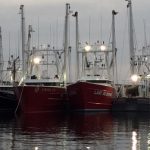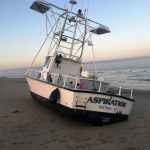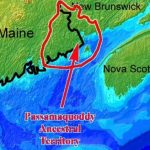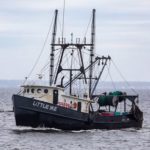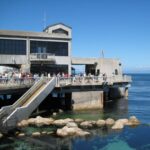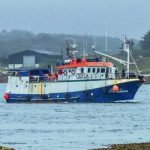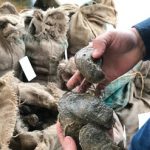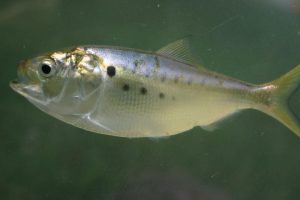Tag Archives: Newfoundland / Labrador
Humane, sustainable Canadian seal harvests an environmental necessity, says USIANL
 The United Seal Industry Association of Newfoundland & Labrador (USIANL) has created a fact-based campaign explaining the environmental necessity for Canada to carry out sustainable seal harvests. The campaign is being piloted in N.L., Halifax, Toronto, Ottawa, Edmonton, Winnipeg, and Vancouver. USIANL was created to help Canadians understand that humane, sustainable seal harvests are an environmental necessity. The harp seal population off N.L. is the largest in the world – numbering in the millions. Not only are harp seals depleting important fish species and everything those species feed on, but fierce competition for food is putting their own well-being at risk. more, >>CLICK TO READ<< 09:39
The United Seal Industry Association of Newfoundland & Labrador (USIANL) has created a fact-based campaign explaining the environmental necessity for Canada to carry out sustainable seal harvests. The campaign is being piloted in N.L., Halifax, Toronto, Ottawa, Edmonton, Winnipeg, and Vancouver. USIANL was created to help Canadians understand that humane, sustainable seal harvests are an environmental necessity. The harp seal population off N.L. is the largest in the world – numbering in the millions. Not only are harp seals depleting important fish species and everything those species feed on, but fierce competition for food is putting their own well-being at risk. more, >>CLICK TO READ<< 09:39
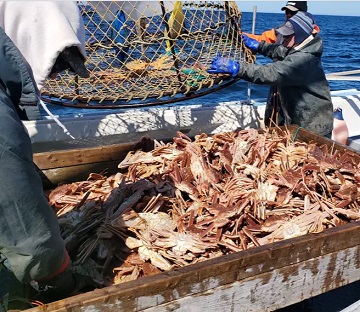
After a record-breaking year for Atlantic snow crab, facing huge price cuts is ‘worse than the moratorium,’
“It’s going to be worse than the moratorium.” That’s Jason Sullivan’s gut feeling about the upcoming 2023 snow crab fishing season. He has no doubt that the record-breaking prices of 2022 are a thing of the past. There’s talk of prices starting somewhere around $2 a pound, a nearly 70 per cent drop from last year’s starting price of $7.60. Sullivan said that would translate to a huge loss for the provincial economy. “We had a billion-dollar industry and now we’re taking $500 million out of it right away,” said the Bay Bulls fisherman. “That’s going to be devastating, especially for rural areas.” >click to read< 13:02
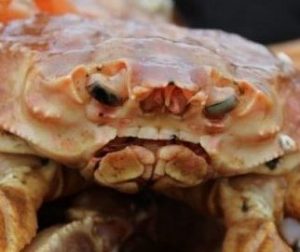
Snow crab prices down by nearly 60 per cent in U.S. market
The snow crab season in Atlantic Canada usually doesn’t get going until mid-April, but that doesn’t mean fresh snow crab is not already hitting the U.S. market. Alaskan fleets finished up their tanner crab season this week. That crab is often marketed under the name “snow crab,” being of similar size and colour. If the Alaskan tanner fishery is a portent of things to come, snow crab catches this year will have much less value than in 2022. The tanner fishery started Jan. 15 with wharf prices at US$3.25 to US$3.35 per pound, according to the latest blog from U.S. seafood analyst Les Hodges. The initial offer from processors was $2.50 a pound, but that offer prompted a strike by the crab fishing fleet, that prompted a bump in the offer from processors. >click to read< 14:04
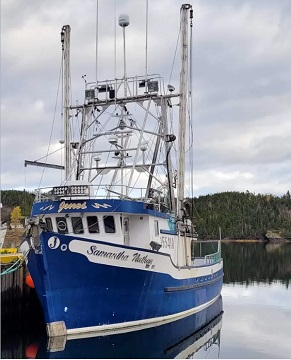
Left-over inventory and inflation could take a bite out of N.L. snow crab prices this year
Trevor Jones has been in the fishing business long enough to know you can’t predict the success of any year until the last pot is hauled and the nets are stored. Jones owns a 65-foot longliner, F/V Samantha Nathan, carrying on the family business that was started by his father. These past few years, snow crab has become the most important catch. Last year crab accounted for just over half the revenue for his enterprise. The record high prices, even with a drop to $6.15 a pound from $7.60 at the start of the season, helped buffer against the cancellation of the mackerel fishery and the no-go for capelin. >click to read< 10:10
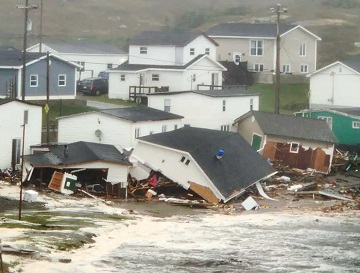
Port aux Basques declares state of emergency as Hurricane Fiona destroys multiple homes, floods streets
A social media post by former provincial cabinet minister Steve Kent claiming one person had been swept out to sea in Port aux Basques because of Hurricane Fiona has been shared nearly 3000 times as of 12:42 p.m. According to RCMP media relations officer Jolene Garland, a report has been received that a woman was washed out into the ocean in Port aux Basques when her home collapsed. Photos, Video clips, >click to read< 13:00
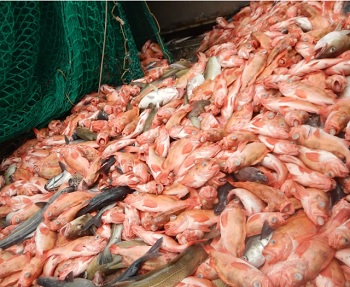
The NLGIDC Supports the Position of an Inshore Fisheries Coalition on the New Redfish Fishery
The Newfoundland and Labrador Groundfish Industry Development Council (NLGIDC) clearly supports the position of a coalition of inshore harvester associations, Indigenous nations, and those involved in seafood processing in Newfoundland & Labrador, Quebec and New Brunswick. This coalition issued a News Release on this important issue on October 14, 2021 that called on the Department of Fisheries and Oceans (DFO) to immediately suspend its consultation process on the rapidly growing redfish resource in the Gulf of St. Lawrence. >click to read< 09:57

Nfld. & Labrador to research live seafood cold storage at Gander International, Port aux Basques for International Export
The Department of Fisheries and Land Resources is looking into creating new areas for cold storage of live seafood in the province, allowing more product headed for international markets to come directly from Newfoundland and Labrador. The provincial government announced $100,000 to determine the feasibility of creating cold storage facilities in Port aux Basques and at Gander International Airport Monday. Fisheries Minister Gerry Byrne said the idea is centred around creating cold storage for live products like lobsters and oysters. >click to read< 16:52
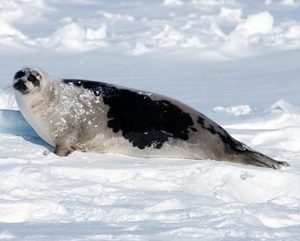
Access To Information docs from DFO shine light on collapse of Atlantic Harp seal harvest
As first reported by Blacklock’s Reporter, the harp seal harvest last year was halved from 2016 despite subsidies paid to processors to promote seal meat recipes. A total 30,435 harp seals were hunted last year, a fraction of the 217,850 taken annually prior to a European Union ban on Canadian seal exports. Legislators have blamed the 2009 E.U. ban on exports of Atlantic pelts, oil and other Atlantic seal products for the death of the industry.,, The Commons fisheries committee in a 2017 report Newfoundland & Labrador’s Northern Cod Fishery said Canada should promote a larger seal hunt, >click to read< 22:30
Large vessel owners accuse FFAW of ‘double standard’ – Fishing industry divided on how to handle northern shrimp
 A union call to shut down the lucrative shrimp fishery off the northeast coast of Newfoundland and the south coast of Labrador because of declining stocks has other players saying that goes too far. It’s a politically charged debate, with roots in the battle between huge factory freezer trawlers and smaller inshore vessels, about who will get a share of the dwindling resource. “I’m nervous,” Twillingate harvester Brad Watkins told the Central Morning Show Thursday, saying a shutdown could drive brokers and buyers to other parts of the world. “That’s a very scary thing to be thinking about. I think they are jumping too fast here,” said Watkins. Read the rest here 16:02
A union call to shut down the lucrative shrimp fishery off the northeast coast of Newfoundland and the south coast of Labrador because of declining stocks has other players saying that goes too far. It’s a politically charged debate, with roots in the battle between huge factory freezer trawlers and smaller inshore vessels, about who will get a share of the dwindling resource. “I’m nervous,” Twillingate harvester Brad Watkins told the Central Morning Show Thursday, saying a shutdown could drive brokers and buyers to other parts of the world. “That’s a very scary thing to be thinking about. I think they are jumping too fast here,” said Watkins. Read the rest here 16:02
Newfoundland & Labrador’s Northern Shrimp Inshore Fleet: a lesson in the importance of small scale fisheries.
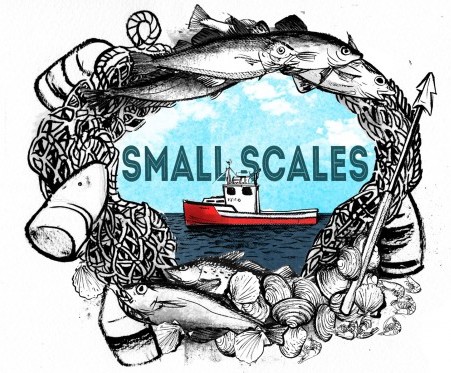 Small scale fisheries are crucial for the social and economic well-being of coastal communities. But when push comes to shove, we need data to back up the sentiment. In the case of Newfoundland and Labrador’s (NL) Northern Shrimp inshore fleet, the shove came in the form of DFO allocations of a declining resource. In 2014, the inshore fleet allocation was cut 26% from 2013 levels while offshore allocation was cut by just 5%. Northern shrimp cuts to the inshore will hurt coastal communities throughout the province,,, Read the rest here 21:28
Small scale fisheries are crucial for the social and economic well-being of coastal communities. But when push comes to shove, we need data to back up the sentiment. In the case of Newfoundland and Labrador’s (NL) Northern Shrimp inshore fleet, the shove came in the form of DFO allocations of a declining resource. In 2014, the inshore fleet allocation was cut 26% from 2013 levels while offshore allocation was cut by just 5%. Northern shrimp cuts to the inshore will hurt coastal communities throughout the province,,, Read the rest here 21:28
“How do you like this sealfie?” – “Sealfies” in support of the seal hunt!!
 Many of you have embraced the “sealfie” movement started in Nunavut last week. It’s a way to show support for the seal hunt, and is directed towards television host Ellen DeGeneres who is opposed to the hunt. Melissa Petten asks, “How do you like this sealfie?” I LOVE IT! See more here cbc 19:25
Many of you have embraced the “sealfie” movement started in Nunavut last week. It’s a way to show support for the seal hunt, and is directed towards television host Ellen DeGeneres who is opposed to the hunt. Melissa Petten asks, “How do you like this sealfie?” I LOVE IT! See more here cbc 19:25
Newfoundland / Labrador Cod fishing for food: right or privilege?

I’m writing on the last day of the first leg of the 2013 recreational cod fishery. It’s early Sunday morning and the rain is pouring down in buckets. There’s quite a breeze of wind blowing as well, a very sweet morning for relaxing or working under a tight roof with a steaming cup of strong black Costa Rican coffee. There won’t be any boats cod fishing off Mad Rock this morning. But you never know, the last day and all, some silly soul might venture forth from a sheltered harbour and risk life and limb for a few fillets of cod. I’ve seen it before with my own eyes. more@weekendtelegram23:11:39






 Fisheries and Oceans Canada (DFO) is claiming that it has the authority to enforce fisheries laws on two Nova Scotia First Nations, and that it can and will send officers into First Nations to enforce its regulations. In a March 18 letter to Sipekne’katik Chief Michelle Glasgow, DFO’s Maritimes region director general Doug Wentzell refuted claims that a series of court rulings deprived his department of authority to manage First Nations fishers.“The courts have repeatedly upheld the Crown’s role in regulating the fishery, as well as the use of licensing as part of fisheries management, even when regulating the exercise of Aboriginal or Treaty rights,” reads Wentzell’s letter, obtained by The Chronicle Herald.
Fisheries and Oceans Canada (DFO) is claiming that it has the authority to enforce fisheries laws on two Nova Scotia First Nations, and that it can and will send officers into First Nations to enforce its regulations. In a March 18 letter to Sipekne’katik Chief Michelle Glasgow, DFO’s Maritimes region director general Doug Wentzell refuted claims that a series of court rulings deprived his department of authority to manage First Nations fishers.“The courts have repeatedly upheld the Crown’s role in regulating the fishery, as well as the use of licensing as part of fisheries management, even when regulating the exercise of Aboriginal or Treaty rights,” reads Wentzell’s letter, obtained by The Chronicle Herald. 


























